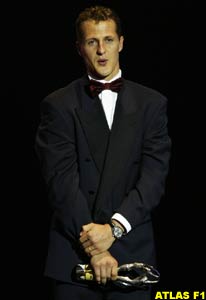
Atlas F1 Senior Writer
Just two days after the most controversial win of his Formula One career, Michael Schumacher received the award for Sportsman of the Year, an irony in a moment when racing fans the world over are criticising the German for his decision to overtake his teammate in Austria. Roger Horton reflects on Schumacher's sportsmanship and his behaviour last Sunday
Obviously there are a good number of racing fans around the world that might have a thing or two to say about that, and the instant reaction of the thousands of fans in Austria appears to have been mirrored around the world if their reactions and feedback as measured in various forms of Internet polling are to be believed.
As I said, the timing of his latest award was unfortunate and in the circumstances it was hardly surprising that he refused to attend the usual post award press conference. After all, the last time he faced the members of the fourth estate they booed and hissed him, just as thousands of Austrian race fans had done within minutes of the four-time champion's 58th Grand Prix victory.
Of course, it is not just Michael Schumacher that is currently in the dock. His team Ferrari also stand accused of heartless manipulation, and in a wider context, the whole sport of Formula One racing is being called a sham, which, in its current rather weakened financial circumstances, is the last thing it needs. In Austria everyone involved scored an own goal and it may yet require the intervention of the World Council to remind all concerned just what bringing the sport in disrepute means.
Ferrari has at least been consistent in their policy of building their team around Michael Schumacher and bowing to his every wish. They at least deserve credit for sticking to their guns and being open about their manipulation of the result. It is a pity though that they have been unable to get their story straight as to just when the decision to make Rubens Barrichello yield to his teammate was made.
Technical Director Ross Brawn contends that "it was given" even before a wheel had turned in Austria. Schumacher himself denied on race morning that team orders would come into play and has stated that he was only advised at the last minute; team boss Jean Todt says it was around lap 63, so like any organisation that suddenly finds itself under pressure, the whole truth is out there somewhere, but not, one suspects yet in the public domain. In the meantime any lie will do provided it suits the purpose of the moment.
And let's not forget that last year, after much more mooted criticism was voiced over the team's decision to force Rubens to vacate his second position to Schumacher, Ferrari President Luca di Montezemolo stated then that: "It would have been different if he had been in the lead and then no one would have touched him, the difference between second and third places doesn't change anything."
Sticking to one's word it seems is not that important in the modern day Ferrari scheme of things. Expediency is everything when it comes to ensuring that nothing comes between Michael Schumacher and a race win.
In my view, it was Michael Schumacher's post race antics on the podium that damns him the most. He was happy to take the win, happy to pass his teammate, happy to punch the air on crossing the line; he only changed his tune upon hearing the reaction of the crowd. His attempts to placate them, and no doubt the worldwide TV audience, by forcing Rubens onto the top step of the Podium and presenting him with the winner's trophy, were frankly pathetic and demeaning.
He had made his own bed by taking the win; he should have been man enough to face the consequences of his actions. Michael Schumacher is a great racing driver, but in Austria he showed himself to be a small man.
And what of Rubens Barrichello's part in all this? There are some that say he should have found another way to let his teammate past, and that he is as culpable as Schumacher and Ferrari. This is arrant nonsense. As you will read elsewhere in this issue, team orders have been around since the sport began, and in almost all cases a driver ordered to yield to a rival (because a teammate is still a rival) has usually slowed in front of the pits to make his point.
Rubens Barrichello may be out of his depth in the politics of Ferrari, but in Austria he outqualified and outraced Michael Schumacher in equal cars, and not too many drivers have ever done that. His drive earned him the dignity of leading until team orders forced him to yield. What he didn't deserve was the public humiliation of being patronised on the podium that all but stripped him of his dignity.
And there is yet another aspect of all this from the Brazilian's point of view. During the race there was a briefly horrifying accident when the Sauber of Nick Heidfeld crashed sideways into the Jordan of Takuma Sato. It is no exaggeration to say that the Japanese driver missed death by inches and it is a reminder that this is still a very dangerous business.
Drivers may get paid to race, but they race for the exhilaration of winning. To permanently take away Barrichello's right to win on merit when he can means, in affect, that he is risking his life for nothing. All teams have imposed team orders for a race, some for a whole season, but only at Ferrari is it a permanent and standard way of operating. They are not exactly an equal opportunity employer, are they?
So what in the end will historians make of the events in Austria? Will it just be a temporary blip on F1's ever changing landscape, or will it become a landmark where the sport finally starts to question the ever-increasing demands of the commercial entities that now dominate what was once a sporting contest between men, and where the best man got to win.
For historians dates mean a lot. Some dates can become so enmeshed in our consciousness that just stating the date by itself can make a statement. December 7, 1941, will always be "A Day of Infamy"; June 6, 1944, will always be "The longest Day"; and more recently, of course 9/11 has become the short form to describe that day of tragedy in New York that so changed the world.
Motor racing also has a lot of such dates and many for tragic reasons. April 7, 1968, marks the day of Jim Clark's death. Likewise, the May of 1982 at Zolder and the May of 1994 at Imola mark the passing of two Formula One legends. Just mention San Marino '94 and most F1 racing people will immediately be transported back to a day that most would like to forget if only they could.
Michael Schumacher is a driver who has his very own set of special dates that have, for much of his career, defined him. Adelaide '94 saw him take his first title by driving his Championship rival off the road with his crippled car. Jerez '97 saw him ram into Jacques Villeneuve in an attempted repeat, only this time no title followed, only official sanction and public condemnation that was almost universal.
Since that day in Spain he has successfully rebuilt his career and gone a long way to repairing what was a tarnished public image. Two World Championships and seemingly countless race wins have cemented his place in motor racing history and underlined his driving superiority. The fans and the media have never been asked to like Michael Schumacher, but they have been left with no choice to at least respect his talent and achievements.
But now we can add Austria '02 to the list of dates we will always remember when evaluating his career. A day when the sport in general shot itself in the foot, Ferrari's shortsightedness and bad judgement showed them to be a team lacking in both common sense and elementary fairness. And Michael Schumacher once again demonstrated that once strapped into his racing car he gets out of touch with reality. A flawed genius whose career seems destined to be stalked by constant controversy even when he wins.
In the midst of all this negative publicity about Ferrari, we can perhaps take heart in at least one result from those Monaco awards. The judges passed over the men from Maranello and voted in the Australian cricket team as the Team of the Year.
Phew! At least they got that one right. Because in case you have forgotten remember that definition.
A Sportsman: A person who is fond of sport, a person who behaves fairly and generously.
Sometimes the timing is just plain unfortunate, and for Michael Schumacher, currently embroiled in yet another controversy over his actions in last Sunday's Austrian Grand Prix, it must have been the last thing he wanted. For on Tuesday evening in Monaco he was announced as the winner of the Laureus World Sportsman of the Year award, edging out the golfer Tiger Woods.
 Definition of a Sportsman: A person who is fond of sport, a person who behaves fairly and generously.
Definition of a Sportsman: A person who is fond of sport, a person who behaves fairly and generously.
Please Contact Us for permission to republish this or any other material from Atlas F1.
